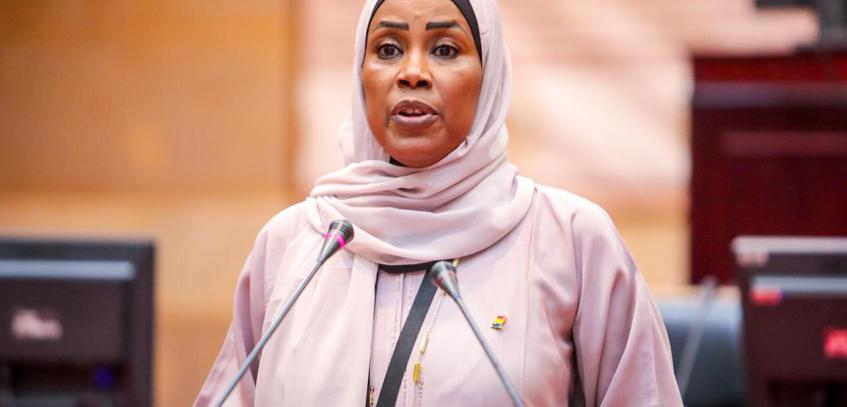Hon. Mrs. Amina Tidjani Yaya, Chairperson of the Women's Caucus of the Pan-African Parliament, presented the comprehensive report of the 14th Pan-African Parliament Conference on Women's Rights during the July 3rd plenary session of the 3rd Ordinary Session of the Sixth Parliament. The annual conference, held in Addis Ababa, Ethiopia, on December 28-29, 2023, convened representatives from international and African institutions, as well as civil society, to empower parliamentarians and stakeholders across African caucuses in advancing women's rights and economic integration.
The conference sought to empower women parliamentarians and participants on women’s issues in Africa, fostering responsive actions that uphold women’s rights, harness the full potential of women’s leadership, and promote the financial inclusion of both women and youth. Moreover, it provided a platform to oversee the endorsement, adaptation, and execution of women’s rights protocols and international treaties protecting human rights, including the African Charter on Human and Peoples' Rights, the Protocol to the African Charter on the Rights of Women in Africa (Maputo Protocol), and the African Union Strategy for Gender Equality and Women's Empowerment 2018-2028.
In line with these objectives, the plenary reaffirmed commitments to the African Union Agenda 2063 and the Sustainable Development Goals, emphasizing the importance of countering gender-based violence and enhancing women's political participation. Key recommendations included urging member countries to expedite the ratification of the Maputo Protocol and enhance support for women's leadership roles. Parliamentarians were encouraged to hasten the signing, ratification, and implementation of mechanisms for the domestication of the Maputo Protocol and advocate for universal ratification among states yet to adopt it.
With substantial support from UN Women, the PAP will organize the next conference focusing on Violence against Women in Politics (VCFP), highlighting strategies to ensure women's political participation, especially in the election year of 2024. Parliaments and national governments are called upon to amend laws supporting women, guaranteeing equal participation in decision-making processes and promoting their political, social, economic, and cultural rights. Member states are encouraged to provide financial backing and training for new female political candidates.
Furthermore, the establishment of mechanisms within PAP and national parliaments to monitor and develop a framework for AU's human rights and governance instruments concerning women was also recommended. Additionally, the creation of a pan-African observatory to monitor the implementation of commitments to eliminate violence against women and girls, analyze data, implement legal instruments, and share best practices was emphasized. Organizing the "16 Days of Activism" campaign against gender-based violence from November 25 to December 10 across all National Parliaments was also highlighted.
The conference proposed a Model Law on Gender-Based Violence (GBV), including provisions on political violence against women and gender parity in decision-making positions. Advocacy for lifting political and individual sanctions on countries in transition, particularly in the Sahel, due to their detrimental effects on women was also stressed. Additionally, promoting gender-responsive national budgets and strategic investments in public and private sectors to achieve gender equality was recommended.
Empowering the Women's Caucus to directly mobilize funds from partners to build financial and technical capacity for its activities was also emphasized as a priority. As well as, ensuring the organization of Women's Caucus and conference activities by member states to enhance visibility.
The Caucus' report was unanimously adopted in plenary with amendments. The activities of the Women’s Caucus of the Pan-African Parliament align with the African Union Agenda 2063’s factors of success, particularly the participation, inclusion, and empowerment of citizens. The caucus’ strategic thrust underscores the necessity of effective participation of all stakeholders in the conception, design, implementation, and monitoring and evaluation of Agenda 2063, making it a fully participatory initiative owned by all the continent’s stakeholders. Engaging women and the youth is critical to rekindle the spirit of working together to forge the destiny of the continent. With empowered citizens and a responsive civil society, social and economic transformation can become a reality.








